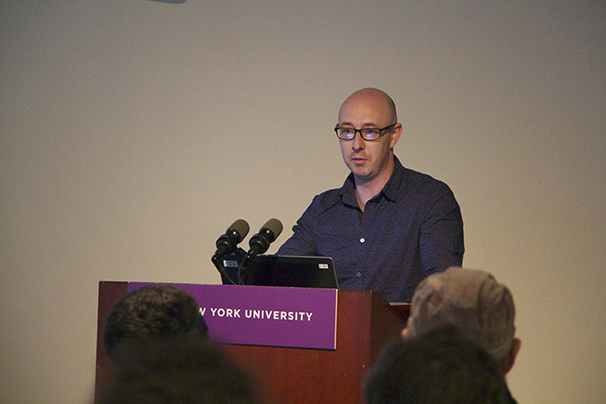
Nicholas McGeehan of the Human Rights Watch, author of a forthcoming HRW report on conditions for migrant workers at NYU Abu Dhabi’s campus and within the city, gave a presentation on Feb. 26 at the Kimmel Center for University Life.
The report, which will be published next month, outlines the abuses of the Kafala system, the laws that regulate the freedoms and rights of migrant workers in the United Arab Emirates, as well as the failure of Western organizations with sites in Abu Dhabi, including the Guggenheim and Louvre, to meet the labor standards they have set for themselves.
“When [migrant workers] arrive in Abu Dhabi, the dream, as you’d like to call it, turns into a nightmare,” McGeehan said.
McGeehan said when he visited workers’ living quarters in Abu Dhabi, he found fire-prone shantytowns with grime-coated kitchens and 12-person bedrooms. For McGeehan, the restrictions the Kafala system places on migrant workers are more troubling than the living and working conditions.
Under the Kafala system, employers put workers from countries like India, Pakistan and the Philippines into debt by charging recruitment fees, paying wages considerably less than promised, withholding pay and confiscating passports so they cannot leave the country, McGeehan said.
“You might say NYU has set up in a country whose labor system facilitates forced labor, which is engaged in a very aggressive crackdown on freedom of expression, which of course is the foundation of academic freedom,” McGeehan said. “[The Kafala system] puts an inordinate amount of control into the hands of the employers.”
Several NYU student groups have taken up the cause, including the Student Labor Action Movement, who co-sponsored the presentation.
Gallatin sophomore Daniel Lightfoot of SLAM said the group hopes the university uses an HRC monitor rather than their own.
“Human Rights Consortium has offered to independently monitor the labor standards but NYU chose to have their own monitor hired by themselves,” Lightfoot said.
Lightfoot and McGeehan both said the monitor that NYU hired, Mott MacDonald, is misrepresenting the situation of migrant workers inside the U.A.E. and has repeatedly issued glowing reports of the working conditions at NYUAD.
Andrew Ross, sociology professor and a speaker at the presentation, echoed these sentiments and said organizations like NYU were in a position to improve the conditions for all workers in the U.A.E.
“The much larger goal was really to try and use the brand names, NYU, Guggenheim, Louvre, to leverage better regional labor standards for the gulf as a whole and to really try and break the Kafala system, which needs to be broken,” Ross said.
Greg Bruno, director of Public Affairs and Community Relations for NYUAD, said NYU has and will continue to take steps to protect the rights of workers at their Abu Dhabi site.
“Since the earliest days of NYU Abu Dhabi, we have committed to ensuring the health and safety of those building, maintaining and operating our campus,” Bruno said. “We take seriously any incident that appears to be in violation of these commitments. Any and all such claims are investigated immediately and, where appropriate, are addressed promptly.”
Luis Morales, an NYUAD sophomore who attended the event, said McGeehan’s findings were not surprising, and NYUAD students were very concerned about the conditions of workers.
“I think that every NYU Abu Dhabi student is aware of the issues that are happening in the country,” Morales said. “I’ve been working on a project that helps some of the workers, and I can say there are students who are trying to do something.”
Following the presentation, members of SLAM led a brief protest outside NYU President John Sexton’s Bobst office. As they recited chants, students from SLAM handed out flyers and waved signs whose slogans included, “I’m paying for what?” and “Who’s building NYU Abu Dhabi?”
A version of this article appeared in the Thursday, Feb. 27 print edition. John Ambrosio is a contributing writer. Email him at [email protected].






















































































































































